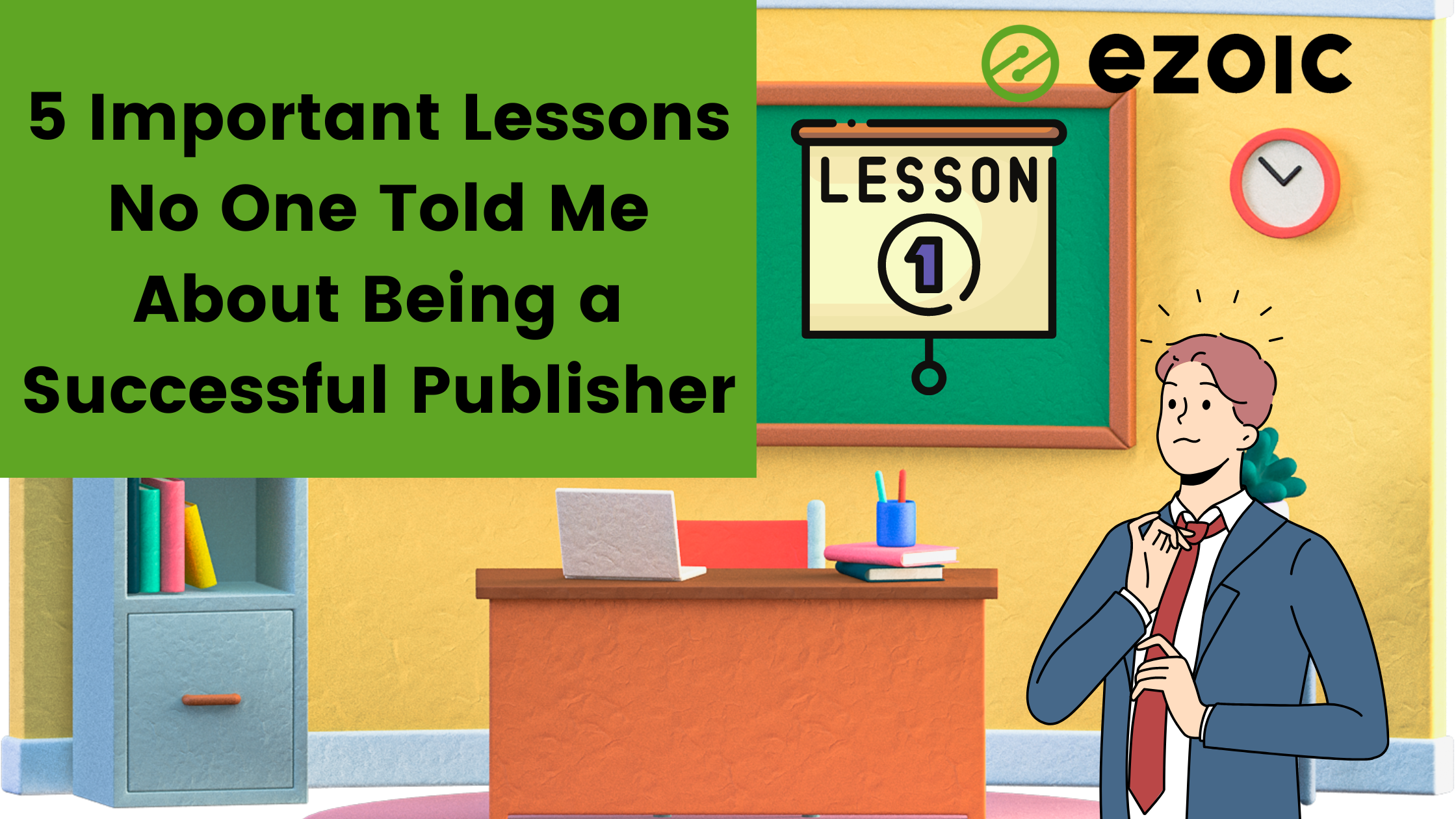
5 Important Lessons No One Told Me About Being a Successful Publisher

Get helpful updates in your inbox
I’ve been a publisher for over ten years now. For the first 4.5 years, I really had no success at all — a measly 50 views/day, 200 subscribers, and no monthly income. I was ready to quit.
Fortunately, things turned around and I was able to build a very successful publishing business with millions of views, tens of thousands of email subscribers, a book deal, and a 6-figure income from my work.
Looking back, there are several crucial lessons no one bothered to tell me, lessons that would’ve made my journey 10x easier if I had known. Here are 5 important lessons I wish I would’ve known about being a successful publisher; I hope they can help you too.
1. You Can’t Do Everything Yourself. If You Want to Truly Grow, You’ll Need Help.
When you’re first starting out, you’re probably going to be doing everything yourself — there’s no one else! You’re going to be integrating website themes, creating email sign up forms, creating/editing content, responding to comments, fixing website bugs, you name it.
But eventually, you’ll reach a point where you can’t, and shouldn’t, do everything yourself. You’ll create a bottleneck in your business, because you’re just one person with very finite energy, time, and resources.
Here’s what I mean. As HubSpot recently discovered, companies that posted four blogs a week got about 4x as much traffic as sites that only posted one blog a week. This means the more you post, the more traffic you’ll probably get. But how many times can you post before you burn out or run out of ideas? How many weeks in a row can you consistently produce several pieces of quality content?

As ConvertKit recently revealed, 61% of content creators they surveyed experienced some form of burnout in the past year alone. It’s a grueling schedule, and can be enormously taxing to continue creating high-quality content (especially when it feels like you’re not even getting any traffic at all).
This just means that you can’t, and shouldn’t, try to do everything yourself. Over time, I was able to reinvest the profits back into my business to hire others to help me with design, graphics, research, editing, and tech support. That way, I could spend all my time on doing the most important tasks for my site, the stuff only I could do — write content, connect with my audience, and build my traffic.
Hire people and use tools to help your site grow. You need help to build your site into what you truly want it to be.
2. It’s Hard to Know When Things Are Working. Keep Publishing.
Numbers vary, but many sites can expect to wait 4–6 months(!) to start seeing any meaningful traffic from SEO. This means that even if you’re not seeing any traffic to your site, it’s not necessarily because your content is bad or your website is broken; you might just need better SEO or to simply wait a little longer for search engines to begin sending your site more traffic.
This is why consistency is so important. Sprout Social recently explained that “Social media algorithms tend to reward accounts that post on a frequent basis rather than every now and then.” In other words: algorithms reward consistency. In a way, you have to prove to your audience and search engine algorithms that they can trust you to reliably create new content.
Back in college, a friend of mine wanted to be a doctor. He said there were mandatory introduction classes that started at 8:00am, four days a week. These were called “weeder classes,” and were designed to “weed out” anyone who wasn’t truly committed to their goals. Each semester, dozens of students would drop out of these grueling classes and change majors, leaving only the truly committed to continue on the path to medical school.
Amusingly, Seth Godin wrote about this very concept in his book The Dip: A Little Book that Teaches You When To Quit: “If you took organic chemistry in college, you’ve experienced the Dip. Academia doesn’t want too many unmotivated people to attempt medical school, so they set up a screen. Organic chemistry is the killer class, the screen that separates the doctors from the psychologists. If you can’t handle organic chemistry, well, then, you can’t go to med school.”
This is a bit how being a publisher works: if you can make it through the first difficult classes (the months of not getting much traffic), only then will you be positioned to become a long-term successful publisher. You have to prove you’re in it for the long haul; that’s just how it works.

3. Create Multiple Streams of Income to Get Your Through Hard Months.
With Google’s search engine algorithm changing hundreds of times each year, it’s not uncommon at all for publishers to wake up one day and see their traffic tanked, with no rhyme or reason behind it. You’ll have slow months, and if you put all your eggs in one basket, you’ll probably experience enormous stress and anxiety when those slow months come.
That’s why you should diversify your income streams. Ezoic maximizes your advertisement revenue so that you’re getting every possible penny you can from advertisers and your content, but there are plenty of other non-ad-related ways to earn income through your site.
I wish someone had told me this. I earned almost $5,000 dollars in one of the first big months for my site; the next month I only made $1,200. This was the first of many huge swings I’d experience as a publisher, and it began taking an enormous toll on my mental health as I hoped things would be steady each month.
For me, I was able to leverage online courses, coaching programs, affiliate links, book sales, and freelance work to help when those slow months inevitably came.
4. Learn From Your Competitors. They’re Succeeding For a Reason.
At Ezoic, our world-class SEO team routinely advises publishers to conduct comparative analyses with other competitors in their niche. Odds are, these competitors have done as much (or more) market research as you, and have found unique and clever ways to connect with their audience, create interesting content, and rank highly in search engines.
It’s a bit like learning a new recipe: instead of trying dozens of times to bake a tasty cake — even when you’ve never made one before — simply look at others who have already figured it out and model their work. They’ve already learned how to bake a cake; there’s no need for you to make all the same mistakes they did!
You can learn something from everyone. For me, I began taking copious notes of my competitors and influencers in my niche: I tracked how often they posted, how many words were in their headlines, how many words their articles had, the layout of their website, and I could even use SEO tools (like Ezoic’s NicheIQ) to analyze what keywords performed best in the niche, test different SEO tags, and even get topics suggested to me to write about.
Millions of people have been publishing for years and years; some of them have become incredibly successful. Don’t waste years trying to figure everything out when your competitors already have answers you can quickly find after studying their content and strategies.

5. Every New Level of Success Will Require a Different “You.”
“What got you here won’t get you there.” -Marshall Goldsmith
When you first start out as a publisher, you’ll probably have a fairly modest setup: a domain, a free website theme, maybe a free email list builder.
But eventually, you’ll need more than that. You might need to invest in a cleaner, more professional website theme. You’ll monetize your content, create some social media profiles, maybe even dip your toes into SEO.
The more you grow as a publisher, the more you’ll need to learn. Like a hermit crab that outgrows its small shell, you’ll need to create bigger and better strategies to sustain your next evolution as a publisher. Otherwise you’ll plateau and hit a ceiling.
The good news? You can speed up this process dramatically by investing in better resources for your site. There are a few obvious resources you should be investing in to grow your site:
- Learn SEO (use tools like NicheIQ)
- Learn to create better content
- Create a more beautiful, user-friendly site (use tools like Ezoic LEAP)
All these take time, and that’s OK. These are some of the best uses of your time as a publisher, and will pay enormous dividends if you invest in them.
In Conclusion
It took me a long time to figure out publishing. Sometimes, it felt like as soon as I learned something, the algorithm would change or the market would switch trends and I’d be left with nothing again. It was frustrating, discouraging, and confusing.
I can’t tell you how everything will play out. I’ve had the rug pulled out from me countless times, just as soon as I started to feel like I was finally getting it. The internet, algorithms, and markets will always change.
But I wish I knew these five lessons before I started publishing; they would’ve saved me a lot of frustration and heartbreak.
I hope these can help you. What are some lessons you wish you knew before you became a publisher? Let me know in the comments below.

Anthony Moore is a writer, speaker, and coach. He's helped hundreds of entrepreneurs create successful businesses, and has gained over 7 million views for his work on entrepreneurship, personal growth, and productivity.
Featured Content
Checkout this popular and trending content

Ranking In Universal Search Results: Video Is The Secret
See how Flickify can become the ultimate SEO hack for sites missing out on rankings because of a lack of video.
Announcement

Ezoic Edge: The Fastest Way To Load Pages. Period.
Ezoic announces an industry-first edge content delivery network for websites and creators; bringing the fastest pages on the web to Ezoic publishers.
Launch

Ezoic Unveils New Enterprise Program: Empowering Creators to Scale and Succeed
Ezoic recently announced a higher level designed for publishers that have reached that ultimate stage of growth. See what it means for Ezoic users.
Announcement
